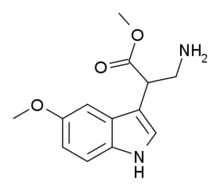Indorenate
Indorenate (TR-3369), is a tryptamine derivative which acts as an agonist at the 5-HT1A, 5-HT1B and 5-HT2C serotonin receptors. It has anxiolytic, antihypertensive and anorectic effects, predominantly through action at 5-HT1A, but with some contribution from the 5-HT1B and 5-HT2C subtypes, and possibly some other non-serotonergic targets also.[1][2][3][4][5][6][7][8][9]
 | |
| Identifiers | |
|---|---|
| |
| CAS Number | |
| PubChem CID | |
| ChemSpider | |
| UNII | |
| CompTox Dashboard (EPA) | |
| Chemical and physical data | |
| Formula | C13H16N2O3 |
| Molar mass | 248.282 g·mol−1 |
| 3D model (JSmol) | |
| |
| |
| | |
See also
References
- Antonaccio MJ, Kerwin L (1981). "On the effects and mechanism of action of the antihypertensive agent TR 3369 (5-methoxytryptamine beta-methylcarboxylate) in spontaneously hypertensive rats". Journal of Cardiovascular Pharmacology. 3 (6): 1306–11. doi:10.1097/00005344-198111000-00018. PMID 6173531.
- Schoeffter P, Hoyer D (November 1988). "Centrally acting hypotensive agents with affinity for 5-HT1A binding sites inhibit forskolin-stimulated adenylate cyclase activity in calf hippocampus". British Journal of Pharmacology. 95 (3): 975–85. doi:10.1111/j.1476-5381.1988.tb11728.x. PMC 1854240. PMID 3207999.
- Fernández-Guasti A, Escalante A, Hong E, Agmo A (September 1990). "Behavioural actions of the serotonergic anxiolytic indorenate". Pharmacology Biochemistry and Behavior. 37 (1): 83–8. doi:10.1016/0091-3057(90)90045-J. PMID 1979877.
- López Cabrera M, Velázquez Martínez DN, Prado R, García G, Ortiz R (1991). "Effects of the intracerebroventricular administration of indorenate and fenfluramine on spontaneous behavior and food intake in rats". Proceedings of the Western Pharmacology Society. 34: 465–8. PMID 1788330.
- Velázquez-Martínez DN, López Cabrera M, Sánchez H, Ramírez JI, Hong E (March 1999). "Discriminative stimulus properties of indorenate, a serotonin agonist". Journal of Psychiatry & Neuroscience. 24 (2): 122–30. PMC 1188992. PMID 10212554.
- Sánchez H, Velázquez-Martínez DN (March 2001). "Discriminative stimulus properties of indorenate, a 5-HT1A, 5-HT1B and 5-HT2C agonist: a study in rats". Journal of Psychopharmacology (Oxford, England). 15 (1): 29–36. doi:10.1177/026988110101500106. PMID 11277605.
- Miranda F, Orozco G, Velázquez-Martínez DN (July 2002). "Full substitution of the discriminative cue of a 5-HT(1A/1B/2C) agonist with the combined administration of a 5-HT(1B/2C) and a 5-HT(1A) agonist". Behavioural Pharmacology. 13 (4): 303–11. doi:10.1097/00008877-200207000-00007. PMID 12218511.
- Miranda F, Hong E, Sánchez H, Velázquez-Martínez DN (January 2003). "Further evidence that the discriminative stimulus properties of indorenate are mediated by 5-HT 1A/1B/2C receptors". Pharmacology Biochemistry and Behavior. 74 (2): 371–80. doi:10.1016/S0091-3057(02)01010-9. PMID 12479957.
- López-Meraz ML, Neri-Bazán L, Rocha L (September 2006). "Indorenate modifies a1-adrenergic and benzodiazepine receptor binding in the rat brain: an autoradiography study". The Journal of Pharmacy and Pharmacology. 58 (9): 1243–8. doi:10.1211/jpp.58.9.0011. PMID 16945183.
This article is issued from Wikipedia. The text is licensed under Creative Commons - Attribution - Sharealike. Additional terms may apply for the media files.